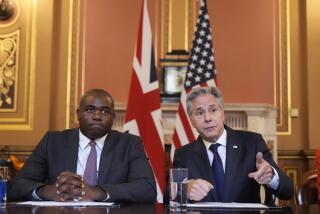An Effort to Avoid a Deadly Leakage : Talks in Moscow will take up nuclear controls
- Share via
Russia and neighboring states of the former Soviet Union are desperately short of hard currency but they are awash in surplus military weaponry, a lot of which, it’s now clear, is finding its way abroad.
The Russian Foreign Ministry confirms, for example, that substantial arms sales to Iran are under way, bolstering the Islamic republic’s determined effort to supplant Iraq as the paramount military power in the Persian Gulf. For decades, Soviet arms transfers were a carefully controlled instrument of Cold War competition to achieve influence in Third World countries. Today such transfers are motivated wholly by an urgent need for cash, a consideration that bodes to undercut some of the sense of responsibility and restraint that may have guided earlier arms transfers.
RICH AND RADICAL: Of greatest concern is the possible leakage of nuclear technology and know-how--even, conceivably, of nuclear weapons--to radical countries like Iran and Libya, whose oil wealth gives them the means to pay well for what they want. The former Soviet Union held as many as 30,000 nuclear warheads in its arsenal. Many of these, situated mainly in Russia, Ukraine, Belarus and Kazakhstan, are scheduled to be dismantled. But proper concerns exist about safeguarding these enormous stocks until they can be destroyed. The collapse of the Soviet Union, as many feared, has set in motion internal nationalistic rivalries and a breakdown in controls that leave open to question the ability of authorities to prevent nuclear weapons or weapons-related technology from being smuggled abroad.
On Wednesday a high-level arms control delegation from the United States is scheduled to arrive in Moscow for a week of meetings with leaders of the four nuclear-armed states. Congress, in one of its wiser acts last year, voted $400 million to help dismantle the Soviet nuclear arsenal. The U.S. delegation will talk about practical steps toward that goal. No less important, it will try to find out what the states are doing and might do better to keep nuclear technology exports under tight controls.
POOR AND TEMPTED: This, though, is only a beginning. Clearly, existing procedures to control both nuclear proliferation and conventional arms transfers will have to be re-examined with the goal of increasing their effectiveness.
Surplus Soviet-made weapons are showing up in arms markets at bargain-basement prices, a temptation to even the poorest of countries to invest in high-technology military equipment. Russia, acknowledging its heavy involvement in the arms trade, says it will consider restraining its sales to volatile areas, like the Persian Gulf, if other major exporters do the same. The United States should be ready to talk about that. But other big sellers--among them China, France, Argentina and Brazil--will have to be brought along if controls are to be effective. Meanwhile, top priority must go to tightening controls over transfers of weapons-related nuclear technologies. The talks that begin this week could prove to be a crucial step in that process.
More to Read
Sign up for Essential California
The most important California stories and recommendations in your inbox every morning.
You may occasionally receive promotional content from the Los Angeles Times.










